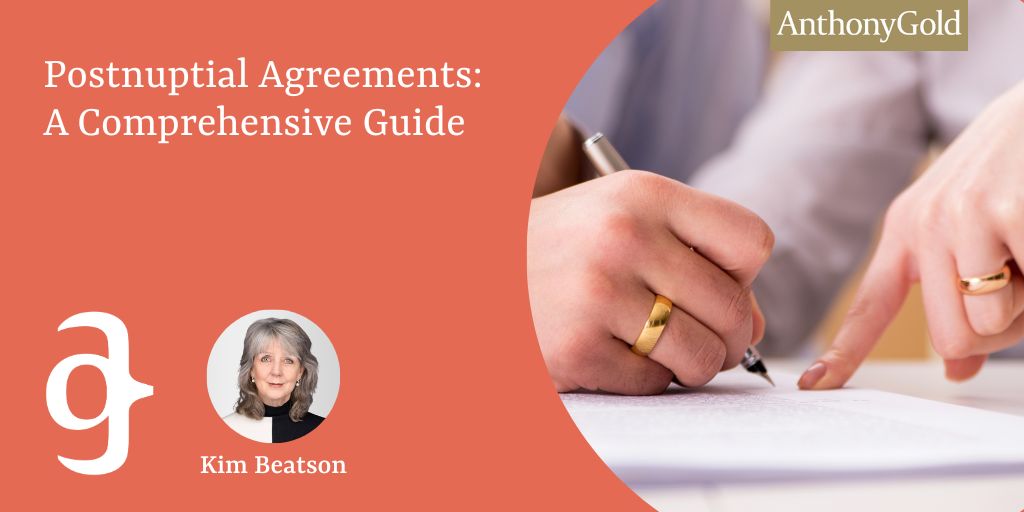Comprehensive Guide to Postnuptial Agreements

When couples get married, they often do not consider the possibility of future disputes or the need for financial arrangements. However, circumstances change, and a postnuptial agreement can provide clarity and security. This guide will explore what a postnuptial agreement is, the different types, key components, and much more to help you make an informed decision.
Skip to the relevant section:
- What is a Postnuptial Agreement?
- What are the Key Components of a Postnuptial Agreement?
- What Issues are Covered by Postnuptial Agreements?
- What Issues are Not Covered by Postnuptial Agreements?
- Why Do Couples Opt for Postnuptial Agreements?
- What are the Advantages and Disadvantages of Postnuptial Agreements?
- How Do You Get a Postnuptial Agreement?
- When Should You Consider Getting a Postnuptial Agreement?
- What is the Difference Between Prenuptial and Postnuptial Agreements?
- Postnuptial Agreement FAQs
What is a Postnuptial Agreement?
A postnuptial agreement, also known as a postnup, is a legal document that married couples can use to outline the division of assets, debts, and financial responsibilities if their marriage ends in separation or divorce.
Unlike prenuptial agreements, which are signed before marriage, postnuptial agreements are created after the couple has already tied the knot. This agreement can address various issues, including property division, spousal support, and other financial matters, offering a clear plan that can prevent disputes and legal battles in the future.
What are the Key Components of a Postnuptial Agreement?
A well-drafted postnuptial agreement must meet specific legal requirements to be considered valid and enforceable. Here are the essential components:
Written Requirement: Oral Agreements Are Not Valid
A postnuptial agreement must be in writing to be enforceable. Oral agreements lack the necessary legal standing.
Voluntary Consent from Both Parties
Both spouses must voluntarily agree to the terms without any coercion or undue influence, ensuring that the agreement is fair and genuine.
Full Disclosure of Relevant Information
Full and transparent disclosure of all relevant financial information is required. This includes assets, liabilities, income, and expenses from both parties.
Fair and Reasonable Terms
The terms of the agreement must be fair and reasonable. An agreement that heavily favours one party may be deemed unconscionable and unenforceable.
Mandatory Signatures from Both Parties
Both parties must sign the agreement to make it legally binding. It is advisable for each party to seek independent legal advice before signing.
What Issues are Covered by Postnuptial Agreements?
Postnuptial agreements can address a wide range of issues, providing clarity and protection for both parties. Here are some of the common matters covered:
Division of Assets
The agreement can specify how assets will be divided in the event of a separation or divorce. This includes real estate, bank accounts, investments, and personal property.
Spousal Support
Terms regarding spousal support or alimony can be outlined, detailing the amount, duration, and conditions under which support will be provided.
Debt Allocation
The agreement can address how debts incurred before and during the marriage will be managed and divided.
Inheritance Rights
Provisions can be made to protect inheritance or specific family heirlooms, ensuring they remain with the intended party.
Business Interests
For couples with shared business interests, the agreement can specify how the business will be handled, including ownership rights and management responsibilities.
Retirement Benefits
The agreement can include terms on the division of retirement benefits, pensions, and other long-term savings.
What Issues are Not Covered by Postnuptial Agreements?
While postnuptial agreements address many critical issues, certain matters typically fall outside their scope:
Child Arrangements and Support
Decisions about children and their support are generally agreed by the parties or in mediation. Court orders based on the child’s best interests are a last resort, but such matters are not usually covered by a postnuptial agreement.
Illegal or Unfair Terms
Any terms that are illegal or grossly unfair to one party will not be upheld. Courts can invalidate provisions that they find unconscionable or unjust.
Personal and Lifestyle Provisions
Provisions dictating personal behaviour, such as chores or social activities, are generally not enforceable.
Waiver of Future Rights
Agreements that attempt to waive rights to future claims, such as future spousal support if circumstances change dramatically, may not be enforceable.
Why Do Couples Opt for Postnuptial Agreements?
Couples choose to enter into postnuptial agreements for a variety of reasons. Here are some common motivations:
Safeguarding an Inheritance
Postnuptial agreements can seek to protect an inheritance by ensuring that inherited assets remain with the intended beneficiary. This is particularly important if one spouse receives a substantial inheritance during the marriage and wants to keep it separate from marital assets.
Financial Security for Stay-at-Home Parents
A postnuptial agreement can provide financial security for a spouse who has chosen to stay at home to care for children. It can outline specific financial support or asset division to compensate for the economic disadvantages of not working outside the home.
Business Asset Division
For couples who co-own a business or where one spouse has significant business interests, a postnuptial agreement can detail how the business will be managed and divided in the event of a divorce. This helps in maintaining the business’s stability and continuity.
Handling Repayment of Gifts
Couples may use postnuptial agreements to address the repayment of substantial gifts received from one spouse’s family. The agreement specifies how these gifts will be treated, ensuring clarity and fairness.
Strengthening a Marriage
Some couples use postnuptial agreements as a tool to strengthen their marriage. By clearly defining financial responsibilities and expectations, couples can reduce conflicts and build trust, leading to a more stable and harmonious relationship.
What are the Advantages and Disadvantages of Postnuptial Agreements?
Advantages of Postnuptial Agreements:
- Clarity and Peace of Mind: Clearly defined terms can prevent future disputes and provide peace of mind.
- Asset Protection: Protects individual assets and business interests.
- Financial Security: Offers financial security for non-working spouses.
- Flexibility: Can be tailored to meet the specific needs of the couple.
- Conflict Reduction: Reduces financial conflicts and misunderstandings.
Disadvantages of Postnuptial Agreements:
- Potential for Conflict: Discussing and drafting a postnuptial agreement can be contentious and strain the relationship.
- Possibility of Unenforceability: If not drafted correctly or deemed unfair, parts of the agreement may not be enforceable.
- Legal Costs: Involves legal fees and potentially high costs for drafting and reviewing the agreement.
- Change in Circumstances: Future changes in circumstances may require modifications to the agreement, leading to additional legal complexities.
How Do You Get a Postnuptial Agreement?
Obtaining a postnuptial agreement involves several important steps:
Step 1: Discuss with Your Spouse: Begin with an open and honest conversation about why you both think a postnuptial agreement is necessary and what you hope to achieve.
Step 2: Consult with Lawyers: Each spouse should have independent legal counsel to ensure their interests are protected and the agreement is fair. Our family law team would be more than happy to take you through your legal options and guide you through the process. Contact us today.
Step 3: Full Disclosure: Both parties must fully disclose their financial situation, including assets, liabilities, income, and expenses.
Step 4:Draft the Agreement: Work with your lawyers to draft an agreement that outlines the terms clearly and comprehensively.
Step 5: Review and Negotiate: Carefully review the draft and negotiate any changes to ensure both parties are satisfied with the terms.
Step 6: Sign the Agreement: Once both parties agree on the terms, sign the document in the presence of witnesses and/or a notary, as required by law.
When Should You Consider Getting a Postnuptial Agreement?
Couples might consider a postnuptial agreement under the following circumstances:
- Significant Financial Changes: Protect new assets from inheritances or windfalls.
- Business Ownership: Define the management and division of a business.
- Career Changes or Retirement: Address financial dynamics when one spouse retires or becomes a stay-at-home parent.
- Marital Difficulties: Provide a framework for reconciliation and financial clarity.
- Protecting Children from Previous Relationships: Ensure financial security and inheritance for children from prior relationships.
- Debt Management: Specify how debts incurred during the marriage will be handled.
- Gifts and Inheritances: Keep significant gifts or inheritances separate from marital assets.
- Clarifying Financial Expectations: Prevent misunderstandings by clearly defining financial responsibilities.
What is the Difference Between Prenuptial and Postnuptial Agreements?
| Aspect | Prenuptial Agreements | Postnuptial Agreements |
| Timing | Created and signed before marriage | Created and signed after marriage |
| Purpose | Protect pre-marital assets, set financial expectations for future assets | Manage new assets, address changes during the marriage |
| Financial Focus | Assets, liabilities, spousal support before marriage | Changes in financial situation after marriage |
| Common Motivations | Inheritance protection, asset safeguarding | Business interests, career changes, marital issues |
| Legal Considerations | Full disclosure, voluntary consent, fairness required | Full disclosure, voluntary consent, fairness required |
| Court’s Role | Courts may scrutinise for fairness before marriage | Courts may scrutinise for fairness after marriage |
Postnuptial Agreement FAQs
Is a Postnuptial Agreement Legally Binding?
A postnuptial agreement is legally compelling if it meets all legal requirements, including being in writing, voluntary consent from both parties, full financial disclosure, fair and reasonable terms, and signed by both parties. Courts will enforce the agreement as long as it adheres to these standards and does not contain any illegal or unconscionable terms, but it is not 100% binding on the English courts.
How Long After Marriage Can You Get a Postnuptial Agreement?
You can get a postnuptial agreement at any time after you are married. There is no specific time frame or deadline for creating a postnuptial agreement. You can establish an agreement that meets your needs, whether you have been married for a few months or many years.
Is There a Deadline to Make a Postnuptial Agreement?
No, there is no deadline to make a postnuptial agreement. Couples can create a postnuptial agreement at any point during their marriage. This flexibility allows couples to address financial and personal changes as they arise, ensuring the agreement reflects their current situation and future plans.
How Much Does a Postnuptial Agreement Cost?
The cost of a postnuptial agreement can vary significantly depending on several factors, including the complexity of the agreement, the need for negotiation, and the legal fees charged by the solicitors involved. On average, the cost can range from a few hundred to several thousand pounds. It is advisable to discuss fees with your solicitor upfront to understand the potential costs involved.
Book a Free 20-Minute Consultation with our Family Lawyers
Our dedicated family law team at Anthony Gold offers a free 20-minute consultation to help you understand your legal options and guide you through the process. Whether you need advice on postnuptial agreements, prenuptial agreements, or other family law matters, our experienced solicitors are here to provide expert guidance tailored to your unique situation. Book your free consultation today.

No comments